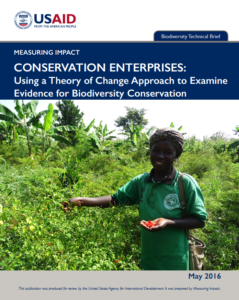
Conservation Enterprises: Using a Theory of Change Approach to Examine Evidence for Biodiversity Conservation
 In this brief, the United States Agency for International Development (USAID) Bureau for Economic Growth, Education, and Environment (E3) Office of Forestry and Biodiversity (FAB) Measuring Impact (MI) project examined the evidence presented in the studies included in Roe et al.’s systematic review of alternative livelihood activites. MI examined the evidence in these studies relative to the assumptions in the theory of change described for conservation enterprises. Key findings include the following: 1) None of the assessments of activities supporting conservation enterprises were designed with a clear theory of change making it difficult to relate some of the outcomes that were measured to the assumptions underlying the strategic approach; 2) Most established enterprises generated economic benefits; 3) Economic benefits co-occurred with positive changes in behavior only about half the time; and 4) There was virtually no assessment of whether changes in behavior led to threat reduction.
In this brief, the United States Agency for International Development (USAID) Bureau for Economic Growth, Education, and Environment (E3) Office of Forestry and Biodiversity (FAB) Measuring Impact (MI) project examined the evidence presented in the studies included in Roe et al.’s systematic review of alternative livelihood activites. MI examined the evidence in these studies relative to the assumptions in the theory of change described for conservation enterprises. Key findings include the following: 1) None of the assessments of activities supporting conservation enterprises were designed with a clear theory of change making it difficult to relate some of the outcomes that were measured to the assumptions underlying the strategic approach; 2) Most established enterprises generated economic benefits; 3) Economic benefits co-occurred with positive changes in behavior only about half the time; and 4) There was virtually no assessment of whether changes in behavior led to threat reduction.Full Citation:
Measuring Impact. 2016. Conservation Enterprises: Using a Theory of Change Approach to Examine Evidence for Biodiversity Conservation. USAID Office of Forestry and Biodiversity/Bureau for Economic Growth, Education, and Environment.

